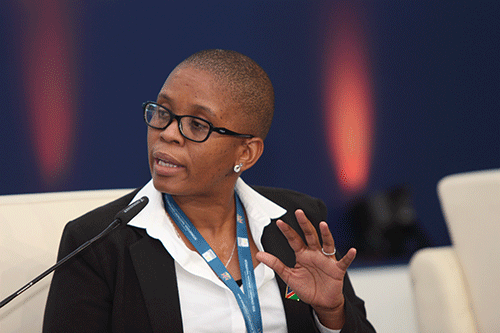Maria Amakali
Aletta Shikololo
A controversial tweet about a cultural event has not just caused a public outcry, but has now ignited a legal tit-for-tat.
The justice minister on Tuesday withdrew Eva-Maria Nangolo’s certificate to operate as Legal Aid lawyer, which caused the latter to threaten legal action should the minister not reverse her decision.
Through her lawyer Sisa Namandje, Nangolo demands that the minister withdraws her decision by no later than close of business today, or be dragged to court.
On Tuesday, Yvonne Dausab informed her fellow parliamentarians that Nangolo will be given a chance to defend herself as the ministry will investigate the tribal remarks against Damara people which she made on social media this week.
“We must remember that this person also has the right to respond, and we need to hear her side of the story. So, investigations have commenced,” she said.
Dausab noted that the ministry has since been “inundated with evidence of various posts”. According to her, they were not privy to some of the social media posts until the latest one which has been making headlines.
The minister said the necessary steps will be taken once the investigations have been completed. She emphasised that the ministry does not condone such remarks, and as such is distancing itself from them.
Nangolo has been informed of the ministry’s decision to withdraw her appointment as Legal Aid counsel as a direct result of her conduct, which the ministry views will negatively affect her ability to carry out her duties as a Legal Aid lawyer. “Kindly take note that the withdrawal of your appointment as Legal Aid counsel does not amount to a dismissal…,” reads the letter.
Nangolo came under fire over her post on social media, which reads: “The Damara people are doing something beautiful, a cultural identity. I love this. This overshadows that violence image of breaking bottles, knife stabbing, insults, no culture identity that I only know of them”. She tweeted so, with pictures of a cultural event last weekend.
Approached for comment, Nangolo said the commotion has left her overwhelmed, and she was not in the right state to respond.
“I am tired, and my phone has been buzzing with almost everyone asking me about the same thing. Right now, I am just overwhelmed. I might end up saying things which might not make sense, so I would rather not comment further,” she muttered. Dausab’s decision to revoke Nangolo’s certificate has sparked a heated debate around freedom of speech and national reconciliation.
While some have applauded the decision to revoke her certificate, arguing that her comments were unacceptable, others have pointed out that she made the comments in her personal space and should have the right to express her opinions.
The Society of Advocates of Namibia said in a statement that they advocate for free speech, expression and debate, but that Nangolo’s tweet was “deeply offensive and derogatory”.
They condemn any form of fundamentalism, tribalism or racism in the legal profession and in Namibia at large, they said, adding that the comments were reckless and irresponsible.
“It is even more concerning that this is not the first time that Ms Nangolo has referred to Damara people in derogatory terms,” said the Society. The incident has likewise ignited a wider discussion about tribalism in Namibia, with some claiming that there can be no true reconciliation while such attitudes persist, while others argued that tribal comments are a normal part of Namibians’ daily life.
However, the Law Society of Namibia (LSN) on Tuesday issued a statement saying
Nangolo is “not an admitted legal practitioner of the High Court”, and therefore not a member of the LSN. In a letter dated 5 April, Nangolo’s lawyer demanded that Dausab reverses her decision, or face them in court.
“We received urgent instructions to advise our client of the validity of the decision you took on 4 April 2023 without giving our client an opportunity to be heard. The decision is, therefore, patently invalid and is liable to be set aside on review in the high court. The minister did not have jurisdiction and power to act,” they said. The lawyers added that the
decision has far-reaching and serious consequences on their client’s rights,
reputation and career, and the decision would cause the further stigmatisation of Nangolo.
Approached for comment, political analyst Rui Tyitende said despite the ongoing discussions around national reconciliation, it is important to acknowledge that there still exists a significant racial divide between those who were oppressed during apartheid and their former oppressors.
“Although our political leaders have spoken at length about the need for national reconciliation, there are no clear guidelines or documents that outline how we have achieved this. Apologies have not been made, and victims have not been properly recognised. While we talk about reconciliation in abstract terms, the reality for those affected is that it remains elusive. “It is not only wrong, but also pervasive for Namibians to stereotype and discriminate against other ethnic groups. Even those in positions of power and influence harbour tribal or racial sentiments,” he emphasised. Tyitende said “as a country, we have a long way to go to eradicate discrimination against ethnic groups and create a truly united society. The onus falls on our leaders to set the example, and refrain from exploiting tribal tensions for their own political gain. There is much work to be done to achieve true national reconciliation and foster a society built on mutual respect and understanding.”


